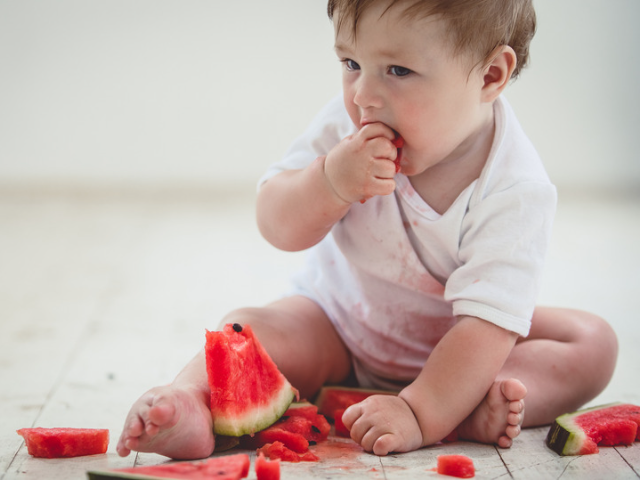Baby-Led Weaning (BLW) is when babies, typically 6 months and older, are allowed to feed themselves using their hands instead of the traditional approach of a parent spoon-feeding a child with puréed foods. This approach puts the baby in charge of their own food intake and can control their eating pace.
Babies learn to self-feed and self-regulate food consumption. BLW does not mean purées cannot be or are never offered! Babies can be offered pre-loaded purées on a spoon and learn to use the utensil with their hands.
Baby led weaning is more about practice and allowing for a slower wean off breast milk or formula. Breast milk or formula should continue to be the primary source of nutrition until at least 1 year of age.
How to know when your child is ready
Discussing developmental readiness with your child’s pediatrician can always be a helpful place to start. In addition, look for the following signs:
- Baby can sit up on their own
- Baby has good head and neck control
- Baby is interested in food
- Baby no longer has a tongue thrust reflex (they don’t immediately push food back out of their mouths)
- Baby is typically around 6 months of age
Common Starter Foods
Choose soft foods or cooked foods that your baby can squish between fingers. Naturally soft foods, like fresh fruit (banana or avocado) or strips of cooked vegetables like carrots and sweet potatoes, are popular starter foods. Avoid choking hazards like whole nuts, thick nut kinds of butter, raisins, leafy greens, raw produce, hot dogs, or popcorn. Make sure you inform your pediatrician if you are going to try BLW.
Benefits of Baby-Led Weaning for Your Child
- Babies become more responsive to their hunger and fullness cues
- Improved fine motor skills, such as grasping and oral development, including chewing
- Decreased chance of being overweight/obese later in life
- Independence for your baby because they are in charge
- Baby is eating the same foods as their family
- More enjoyable mealtimes
- It is less expensive




